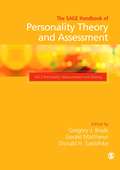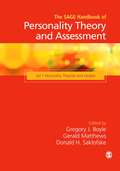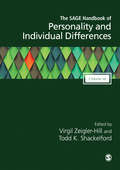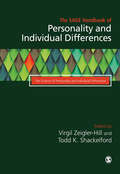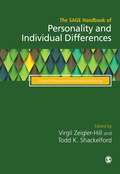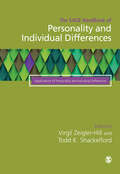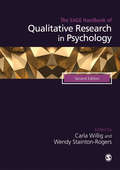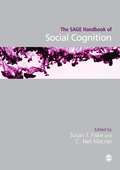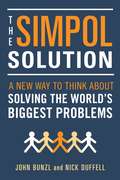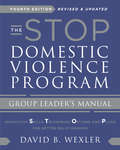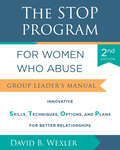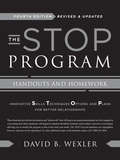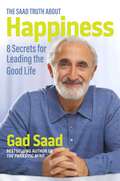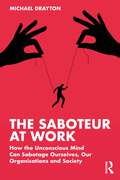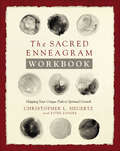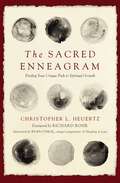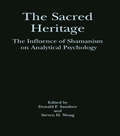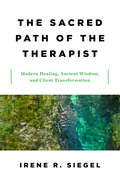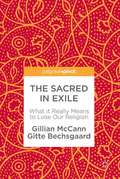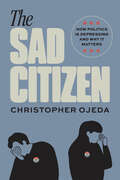- Table View
- List View
The SAGE Handbook of Personality Theory and Assessment: Personality Measurement and Testing (Volume 2) (Volume #2)
by Gerald Matthews Professor Gregory J Boyle Dr Donald H SaklofskeA definitive, authoritative and up-to-date resource for anyone interested in the theories, models and assessment methods used for understanding the many factes of Human personality and individual differences This brand new Handbook of Personality Theory and Assessment 2-Volume Set constitutes an essential resource for shaping the future of the scientific foundation of personality research, measurement, and practice. There is need for an up-to-date and international Handbook that reviews the major contemporary personality models Vol. 1 and associated psychometric measurement instruments Vol. 2 that underpin the scientific study of this important area of individual differences psychology, and in these two Handbooks this is very much achieved. Made unique by its depth and breadth the Handbooks are internationally edited and authored by Professors Gregory J. Boyle, Gerald Matthews, and Donald H. Saklofske and authored by internationally known academics, this work will be an important reference work for a host of researchers and practitioners in the fields of individual differences and personality assessment, clinical psychology, educational psychology, work and organizational psychology, health psychology and other applied fields as well. Volume 2: Personality Measurement and Assessment. Covers psychometric measurement of personality and has coverage of the following broad topics, listed by section heading: " General Methodological Issues " Multidimensional Personality Instruments " Assessment of Biologically-Based Traits " Assessment of Self-Regulative Traits " Implicit, Projective And Objective Measures Of Personality " Abnormal Personality Trait Instruments " Applications of Psychological Testing
The SAGE Handbook of Personality Theory and Assessment: Personality Theories and Models (Volume 1) (Volume #1)
by Gerald Matthews Professor Gregory J Boyle Dr Donald H SaklofskeThis Handbook of Personality Theory and Assessment 2-Volume Set constitutes an essential resource for shaping the future of the scientific foundation of personality research, measurement, and practice. It reviews the major contemporary personality models (Volume 1) and associated psychometric measurement instruments (Volume 2) that underpin the scientific study of this important area of psychology. With contributions from internationally renowned academics, this work will be an important reference work for a host of researchers and practitioners in the fields of individual differences and personality assessment, clinical psychology, educational psychology, work and organizational psychology, health psychology and other applied fields as well. Volume 1: Personality Theories and Models. Deals with the major theoretical models underlying personality instruments and covers the following broad topics, listed by section heading: " Explanatory Models For Personality " Comprehensive Trait Models " Key Traits: Psychobiology " Key Traits: Self-Regulation And Stress " New Trait And Dynamic Trait Constructs " Applications
The SAGE Handbook of Personality and Individual Differences
by Todd K. Shackelford Virgil Zeigler-HillThe examination of personality and individual differences is a major field of research in the modern discipline of psychology. Concerned with the ways humans develop an organised set of characteristics to shape themselves and the world around them, it is a study of how people come to be ‘different’ and ‘similar’ to others, on both an individual and a cultural level. The SAGE Handbook of Personality and Individual Difference is the broadest and most comprehensive overview of the field to date. With outstanding contributions from leading scholars across the world, this is an invaluable resource for researchers and graduate students. Its three volumes cover all of the central concepts, domains and debates of this globally-expanding discipline, including the core theoretical perspectives, research strategies, as well as the origins, applications, and measurement of personality and individual difference.
The SAGE Handbook of Personality and Individual Differences: Volume I: The Science of Personality and Individual Differences
by Virgil Zeigler-Hill Dr Todd K. ShackelfordThe examination of personality and individual differences is a major field of research in the modern discipline of psychology. Concerned with the ways humans develop an organised set of characteristics to shape themselves and the world around them, it is a study of how people come to be ‘different' and ‘similar' to others, on both an individual and a cultural level. This volume explores the scientific foundations of personality and individual differences, in chapters arranged across three thematic sections: Part 1: Theoretical Perspectives on Personality and Individual Differences Part 2: Research Strategies for Studying Personality and Individual Differences Part 3: The Measurement of Personality and Individual Differences With outstanding contributions from leading scholars across the world, this is an invaluable resource for researchers and graduate students.
The SAGE Handbook of Personality and Individual Differences: Volume I: The Science of Personality and Individual Differences
by Virgil Zeigler-Hill Dr Todd K. ShackelfordThe examination of personality and individual differences is a major field of research in the modern discipline of psychology. Concerned with the ways humans develop an organised set of characteristics to shape themselves and the world around them, it is a study of how people come to be ‘different' and ‘similar' to others, on both an individual and a cultural level. This volume explores the scientific foundations of personality and individual differences, in chapters arranged across three thematic sections: Part 1: Theoretical Perspectives on Personality and Individual Differences Part 2: Research Strategies for Studying Personality and Individual Differences Part 3: The Measurement of Personality and Individual Differences With outstanding contributions from leading scholars across the world, this is an invaluable resource for researchers and graduate students.
The SAGE Handbook of Personality and Individual Differences: Volume II: Origins of Personality and Individual Differences
by Virgil Zeigler-Hill Dr Todd K. ShackelfordThe examination of personality and individual differences is a major field of research in the modern discipline of psychology. Concerned with the ways humans develop an organised set of characteristics to shape themselves and the world around them, it is a study of how people come to be ‘different' and ‘similar' to others, on both an individual and a cultural level. This volume focuses on the multiple origins of personality and individual differences, in chapters arranged across three thematic sections: Part 1: Biological Origins of Personality and Individual Differences Part 2: Developmental Origins of Personality and Individual Differences Part 3: Environmental Origins of Personality and Individual Differences With outstanding contributions from leading scholars across the world, this is an invaluable resource for researchers and graduate students.
The SAGE Handbook of Personality and Individual Differences: Volume II: Origins of Personality and Individual Differences
by Virgil Zeigler-Hill Dr Todd K. ShackelfordThe examination of personality and individual differences is a major field of research in the modern discipline of psychology. Concerned with the ways humans develop an organised set of characteristics to shape themselves and the world around them, it is a study of how people come to be ‘different' and ‘similar' to others, on both an individual and a cultural level. This volume focuses on the multiple origins of personality and individual differences, in chapters arranged across three thematic sections: Part 1: Biological Origins of Personality and Individual Differences Part 2: Developmental Origins of Personality and Individual Differences Part 3: Environmental Origins of Personality and Individual Differences With outstanding contributions from leading scholars across the world, this is an invaluable resource for researchers and graduate students.
The SAGE Handbook of Personality and Individual Differences: Volume III: Applications of Personality and Individual Differences
by Virgil Zeigler-Hill Dr Todd K. ShackelfordThe examination of personality and individual differences is a major field of research in the modern discipline of psychology. Concerned with the ways humans develop an organised set of characteristics to shape themselves and the world around them, it is a study of how people come to be ‘different' and ‘similar' to others, on both an individual and a cultural level. This volume focuses on various contexts and applications of personality and individual differences, in chapters arranged across three thematic sections: Part 1: Health and Psychological Adjustment Part 2: Social Behavior Part 3: Personality in the Workplace With outstanding contributions from leading scholars across the world, this is an invaluable resource for researchers and graduate students.
The SAGE Handbook of Personality and Individual Differences: Volume III: Applications of Personality and Individual Differences
by Virgil Zeigler-Hill Dr Todd K. ShackelfordThe examination of personality and individual differences is a major field of research in the modern discipline of psychology. Concerned with the ways humans develop an organised set of characteristics to shape themselves and the world around them, it is a study of how people come to be ‘different' and ‘similar' to others, on both an individual and a cultural level. This volume focuses on various contexts and applications of personality and individual differences, in chapters arranged across three thematic sections: Part 1: Health and Psychological Adjustment Part 2: Social Behavior Part 3: Personality in the Workplace With outstanding contributions from leading scholars across the world, this is an invaluable resource for researchers and graduate students.
The SAGE Handbook of Qualitative Research in Psychology
by Carla Willig Wendy Stainton RogersOne of our bestselling handbooks, The SAGE Handbook of Qualitative Research in Psychology, is back for a second edition. Since the first edition qualitative research in psychology has been transformed. Responding to this, existing chapters have been updated, and three new chapters introduced on Thematic Analysis, Interpretation and Netnography. With a focus on methodological progress throughout, the chapters are organised into three sections: Section One: Methods Section Two: Perspectives and Techniques Section Three: Applications In the field of psychology and beyond, this handbook will constitute a valuable resource for both experienced qualitative researchers and novices for many years to come.
The SAGE Handbook of Qualitative Research in Psychology
by Carla Willig Wendy Stainton RogersOne of our bestselling handbooks, The SAGE Handbook of Qualitative Research in Psychology, is back for a second edition. Since the first edition qualitative research in psychology has been transformed. Responding to this, existing chapters have been updated, and three new chapters introduced on Thematic Analysis, Interpretation and Netnography. With a focus on methodological progress throughout, the chapters are organised into three sections: Section One: Methods Section Two: Perspectives and Techniques Section Three: Applications In the field of psychology and beyond, this handbook will constitute a valuable resource for both experienced qualitative researchers and novices for many years to come.
The SAGE Handbook of Qualitative Research in Psychology
by Carla Willig Wendy Stainton RogersOne of our bestselling handbooks, The SAGE Handbook of Qualitative Research in Psychology, is back for a second edition. Since the first edition qualitative research in psychology has been transformed. Responding to this, existing chapters have been updated, and three new chapters introduced on Thematic Analysis, Interpretation and Netnography. With a focus on methodological progress throughout, the chapters are organised into three sections: Section One: Methods Section Two: Perspectives and Techniques Section Three: Applications In the field of psychology and beyond, this handbook will constitute a valuable resource for both experienced qualitative researchers and novices for many years to come.
The SAGE Handbook of Social Cognition
by Susan T. Fiske C Neil MacraeThe SAGE Handbook of Social Cognition is a landmark volume. Edited by two of the field's most eminent academics and supported by a distinguished global advisory board, the 56 authors - each an expert in their own chapter topic - provide authoritative and thought-provoking overviews of this fascinating territory of research. Not since the early 1990s has a Handbook been published in this field, now, Fiske and Macrae have provided a timely and seminal benchmark; a state of the art overview that will benefit advanced students and academics not just within social psychology but beyond these borders too. Following an introductory look at the 'uniqueness of social cognition', the Handbook goes on to explore basic and underlying processes of social cognition, from implicit social cognition and consciousness and meta-cognition to judgment and decision-making. Also, the wide-ranging applications of social cognition research in 'the real world' from the burgeoning and relatively recent fields of social cognitive development and social cognitive aging to the social cognition of relationships are investigated. Finally, there is a critical and exciting exploration of the future directions in this field. The SAGE Handbook of Social Cognition will be an indispensable volume for any advanced student or academic wanting or needing to understand the landscape of social cognition research in the 21st century.
The SIMPOL Solution: A New Way to Think about Solving the World's Biggest Problems
by John Bunzl Nick DuffellThe SIMPOL Solution, spearheaded by the Simultaneous Policy (SIMPOL) Organization, gives voters around the world a new way to pressure their leaders to address global problems ranging from climate change to mass immigration and gross income disparities.Blending politics and psychology, The SIMPOL Solution shows how through simultaneous action--through cooperation--we can overcome the problems we face today and our children will face tomorrow.The authors argue that the chief barrier to tackling pressing international issues is a vicious circle of destructive global competition, in which nations, corporations, and citizens are helplessly caught. Our current economic system--which rewards corporations and nations that offer the greatest profits no matter what the social costs--has the effect of hollowing out national politics and encouraging either voter apathy or populism championed by the Far Right.The good news is that it doesn't take masses of people to break this vicious circle and initiate lasting change. In fact, key transitions in human history were initiated by small numbers of activists. Already endorsed by leading policy-makers, visionaries, and public figures, this exciting book offers everyone a way to become a part of this important worldwide movement for change.
The STOP Domestic Violence Program (Fourth Edition): Group Leader's Manual
by David B. WexlerAn update to this best-selling treatment program for domestic violence abusers. The bold interventions from STOP have now been field-tested for more than thirty years among military and civilian populations—and STOP has now treated more than 50,000 domestic violence offenders. David Wexler’s program offers therapists, social workers, and other counselors a new level of sound, psychologically based interventions that reach the very men who often seem so unapproachable in a treatment setting. Treatment providers will find new sessions—based on the latest evidence-supported strategies—on insecure attachment issues, stages of change, groundbreaking results from the Adverse Childhood Experiences (ACE) study, normative male alexithymia, stake in conformity issues, substance abuse issues, and more. This new edition integrates twenty- four field- tested video clips to dramatically illustrate key issues for the group. Presented in a 26- or 52-week psychoeducational format, STOP is packed with updated skills, exercises, videos, handouts, and homework assignments that challenge men to examine themselves and develop new tools to manage their relationship issues.
The STOP Program for Women Who Abuse: Group Leader's Manual (Second)
by David B. WexlerA comprehensive manual for treating intimate partner violence—now updated and revised. Long disregarded, female domestic violence is rapidly gaining awareness as research proves not only that it exists, but that the frequency of women abusing men is much higher than previously assumed. While certain core elements of intimate partner violence are shared among all offenders, female offenders face unique triggers, personal backgrounds, and relationship dynamics. Now fully updated and revised, The STOP Program for Women Who Abuse is the most innovative and comprehensive manual to address domestic violence treatment specifically for female offenders, with a program targeted to engage women in their own healing process. This second edition includes new sessions on the Five Love Languages, the Stages of Change, and Stake in Conformity, and updates throughout the text reflect an increased emphasis on trauma theory, attachment theory, mindfulness techniques, and gratitudes. Handouts and homework for participants (sold separately) provide structure for recovery in group sessions and at home.
The STOP Program: Handouts And Homework
by David B. WexlerWorksheets and exercises to accompany this powerful therapeutic program. Fully revised and updated to accompany the fourth edition of the STOP Domestic Violence program, these handouts are critical to keeping participants actively engaged in overcoming their abusive tendencies. Packaged as functional loose-leaf sheets, they can be added, removed, or rearranged to suit the needs of any group leader administering the program.
The Saad Truth about Happiness: 8 Secrets for Leading the Good Life
by Gad SaadThe Quest for Happiness Is a Universal Fact.It is a scientific fact, which means we can measure happiness, we can assess it, and we can devise strategies to make ourselves happy and fulfilled human beings. So says Professor Gad Saad, the author of the sensational bestseller The Parasitic Mind and the irrepressible host of The Saad Truth podcast. In this provocative, entertaining, and life-changing new book, he roams through the scientific studies, culls the wisdom of ancient philosophy and religion, and draws on his extraordinary personal experience as a refugee from war-torn Lebanon turned academic celebrity. In The Saad Truth about Happiness you&’ll learn the secrets to living the good life, including: • How to live the life you want—not necessarily the life expected of you • Why resilience is a key to happiness • Why your career needs to have a higher purpose than a paycheck • Why variety truly can be the spice of life • Why choosing the right spouse is so important • Why Aristotle had it right when he preached moderation • Why you should take a hint from your dog and realize that playfulness equals happiness The Saad Truth about Happiness is as lively, stimulating, and captivating as its author, who has become a "de facto global therapist" to an ever-growing audience of hundreds of thousands of people. Read this book and you&’ll see why so many seek his counsel.
The Saboteur at Work: How the Unconscious Mind Can Sabotage Ourselves, Our Organisations and Society
by Michael DraytonThe Saboteur at Work describes how unconscious psychological processes can sabotage individual lives, the functioning of groups, teams and organisations, and even global politics. Drawing on research in the fields of psychology and organisations, this comprehensive yet straightforward and accessible book enables you to understand how the unconscious can impact progress and performance and describes practical techniques you can use to overcome the saboteur, individually and at work. The book discusses the modern understanding of our adaptive unconscious, and you will learn about repression, imposter syndrome and other defence mechanisms. Ideas are brought to life using real-world examples and personal, organisational and national stories. The book explores the mind’s capacity for self-deception by telling the story of Tony Blair and the invasion of Iraq and looks at unconscious processes in organisations, asking what role the saboteur played in huge corporate failures such as the collapse of Barings Bank and the Boeing 737 Max scandal. The saboteur also operates on a larger scale – governments and societies can be sabotaged by this unconscious force. In Nazi Germany, how did normal, decent people behave like monsters, colluding with or actively participating in the murder of innocent people? Why did big US corporates like IBM, Ford and Chrysler work with the Nazis to make the Holocaust possible? If you manage a team or lead an organisation, you need to understand the role played by the saboteur in your workplace and in your own career and life. This book enables leaders and managers to develop their leadership skills by understanding how the unconscious impacts individual, group and social processes. It will also be of use to coaches and organisational consultants working in the areas of teams and performance.
The Sacred Enneagram Workbook: Mapping Your Unique Path to Spiritual Growth
by Christopher L. Heuertz Estee ZandeeWhether you are looking to discover your type for the first time or take a deeper dive into your identity, The Sacred Enneagram Workbook is designed to help you grow in your spiritual life through the understanding of your Enneagram type.Most of us spend a lifetime trying to figure out who we are and how we relate to others and God. This task is far from easy, yet the Enneagram offers a bright path to cutting through the internal clutter and finding our way back to who we are created to be. And The Sacred Enneagram Workbook creates the reflective space necessary to map your way home. Join international Enneagram teacher Chris Heuertz in this interactive companion to the bestselling The Sacred Enneagram to discover:Where you find yourself in the Enneagram's nine type profiles, and how to make sense of testing resultsHow to move beyond counterproductive caricatures of your type toward true growthTools and practices for breaking out of your greatest emotional, interpersonal, and spiritual challengesAnd ultimately, your type's unique invitation and path toward a deeper journey with God
The Sacred Enneagram: Finding Your Unique Path to Spiritual Growth
by Richard Rohr Christopher L. HeuertzFor all the ways we live unawakened lives, the enneagram is here to help.The Sacred Enneagram is a trustworthy, richly insightful guide to finding yourself in the enneagram’s 9-type profiles, and applying this practical wisdom for a life transformed. Far more than a personality test, author Chris Heuertz writes, the enneagram is a sacred map to the soul. Lies about who we think we are keep us trapped in loops of self-defeat. But the enneagram offers a bright path to cutting through the internal clutter and finding our way back to God and to our true identity as God created us.Chris Heuertz’ life was forever changed after he learned about the enneagram 15 years ago. Today, he leads enneagram workshops all over the world. Join Chris as he shows you how this ancient tool can help you awaken to the gifts God has given you, find freedom from your personal patterns of sin and fear, and grow in acceptance of your identity as you grow with God.In conversational style with compelling stories, The Sacred Enneagram will show youHow to understand the 'why' behind your type, beyond caricatures and stereotypesHow to align your type with prayer posturesHow to identify and find freedom from self-destructive patternsHow to grow in spiritual discernmentHow to face your past wounds and step toward healingHow to awaken your unique gifts to serve today’s broken worldChris’s own journey with the enneagram is an accessible introduction and exploration of how the enneagram can change your life, because to the extent that we are transformed, the world will be transformed.
The Sacred Heritage: The Influence of Shamanism on Analytical Psychology
by Donald F. Sandner Steven H. WongThe contributors to this volume describe the many facets shamanism and depth psychology have in common: animal symbolism; recognition of the reality of the collective unconscious; and healing rituals that put therapist and patient in touch with transpersonal powers. By reintroducing the core of shamanism in contemporary form, these essays shape a powerful means of healing that combines the direct contact with the inner psyche one finds in shamanism with the self-reflection and critical awareness of modern consciousness. The contributors' draw from experiences both inside and outside the consulting room, and with cultures that include the Lakota Sioux, and those of the Peruvian Andes and the Hawaiian Islands. The focus is on those aspects of shamanism most useful and relevant to the modern practice of depth psychology. These explorations bring the young practice of analytical psychology into perspective as part of a much more ancient heritage of shamanistic healing.
The Sacred Path of the Therapist: Modern Healing, Ancient Wisdom, And Client Transformation
by Irene R. SiegelIntegrating Western psychological understanding with ancient Eastern and wisdom traditions, Siegel addresses how spiritual resonance is achieved within the psychotherapeutic process in The Sacred Path of the Therapist. Readers will learn how mindfulness practices and attunement can help them move clients toward recovery and beyond, allowing full potential to emerge within a shared coherent field of awakening consciousness. Topics include translating transpersonal theory into practice, understanding the human energy field, and the integration of psychotherapy and spiritual initiation. Drawing from her unique experiences working with master shamans as well as practicing as a psychotherapist, Irene Siegel discusses the evolving role of the therapist as both therapist and healer. Shamans are ancestral teachers, guides to nonordinary realms of consciousness and a divine cosmic whole within silent sacred spaces. Using lessons from native shamanic tradition and the evolving field of transpersonal psychology, both healer and client will learn to access the innate inner wisdom and healing potential within themselves through guided meditation exercises within moment-by-moment sacred space. The expanding content and context of therapy blends the two worlds: the clinical world and the world of the shaman.
The Sacred in Exile: What It Really Means To Lose Our Religion
by Gillian Mccann Gitte BechsgaardThis book addresses the fact that, for the first time in history, a large segment of the population in the western world is living without any form of religious belief. While a number of writers have examined the implications of this shift, none have approached the phenomenon from the perspective of religious studies. The authors examine what has been lost from the point of view of sociology, psychology, and philosophy of religion. The book sits at the nexus of a number of important debates including: the role of religion in public life, the connection between religion and physical and psychological well-being, and the implications of the loss of ritual in terms of maintaining communities.
The Sad Citizen: How Politics Is Depressing and Why It Matters
by Christopher OjedaFor many citizens, politics is depressing. How has this come to be the norm? And, how is it influencing democracy? From rising polarization to climate change, today’s politics are leaving many Western democracies in the throes of malaise. While anger, anxiety, and fear are loud emotions that powerfully activate voters, depression is quiet, demobilizing, and less visible as a result. Yet its pervasiveness is cause for concern: after all, democracy should empower citizens. In The Sad Citizen, Christopher Ojeda draws on wide-ranging data from the United States and beyond to explain how politics is depressing, why this matters, and what we can do about it. Integrating insights from political science, sociology, psychology, and other fields, The Sad Citizen exposes the unhappy underbelly of contemporary politics and offers fresh ideas to strengthen democracy and help citizens cope with the stress of politics.
